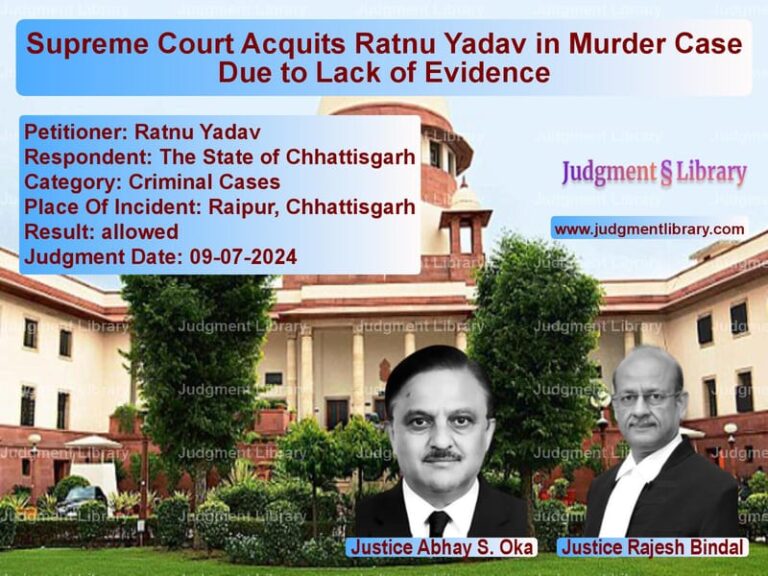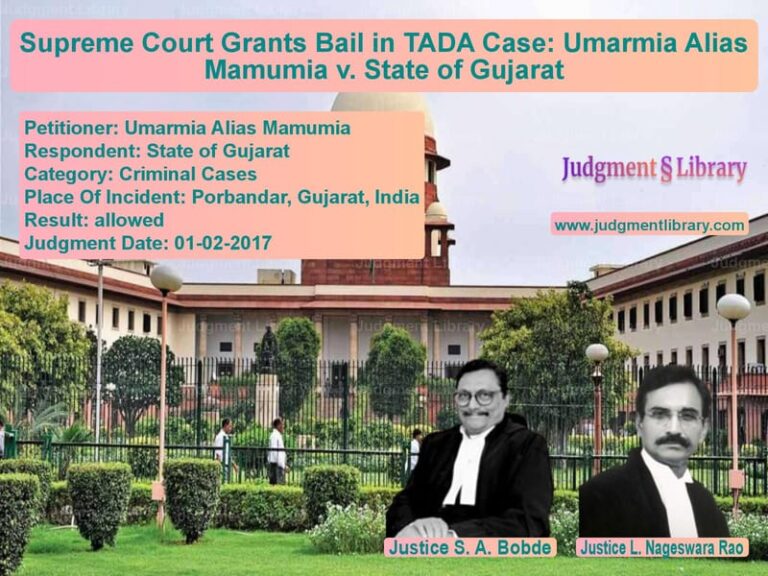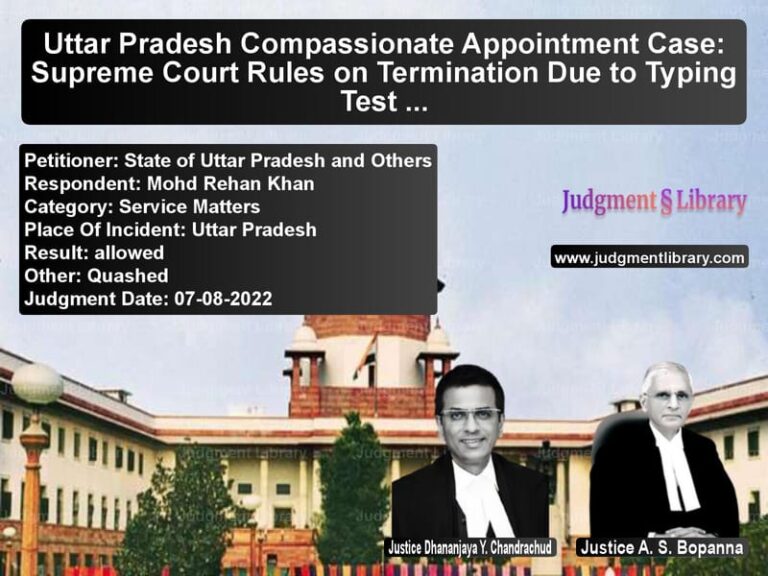Disciplinary Action Against Government Employee Upheld Over Embezzlement Allegations
Ram Prakash Singh, a government servant in the State of Uttar Pradesh, found himself entangled in a legal battle that revolved around charges of financial misconduct. This case navigated through the departmental channels, disciplinary authorities, tribunals, and finally reached the apex court. The petitioner challenged the disciplinary proceedings initiated against him and the consequential punishment imposed after a departmental inquiry found him guilty of financial irregularities during his tenure as Assistant Consolidation Officer in Kushinagar, Uttar Pradesh.
Background of the Disciplinary Proceedings
The petitioner, Ram Prakash Singh, was accused of embezzling public money by making unauthorized disbursements. As Assistant Consolidation Officer, he was alleged to have released payments on forged muster rolls and manipulated official records, leading to significant financial loss to the state exchequer. The charges leveled against him led to the initiation of departmental proceedings under the Uttar Pradesh Government Servant Conduct Rules, 1956.
The disciplinary authority conducted a preliminary inquiry and subsequently issued a charge-sheet. The petitioner contested the charges, asserting that they were baseless and stemmed from malice and procedural impropriety. However, an inquiry officer was appointed, and after a detailed examination of witnesses and evidence, the inquiry report found the petitioner guilty of misconduct.
Arguments Raised by the Petitioner
Before the Supreme Court, the petitioner contended that the entire disciplinary proceeding was vitiated on several grounds. He submitted:
“The charges were based on no admissible evidence, and the findings of the inquiry officer were perverse and without application of mind.”
“The inquiry report relied on documents that were not supplied to him during the inquiry, thereby violating principles of natural justice.”
“There was a violation of Rule 14(4) of the Conduct Rules, as the presenting officer examined witnesses behind the petitioner’s back and their testimonies were relied upon without cross-examination.”
He also relied on precedent decisions, arguing that the charges were not substantiated and the punishment was disproportionate.
Contentions of the Respondent
The State of Uttar Pradesh, representing the respondent side, submitted that the inquiry proceedings were conducted strictly in accordance with law. They contended:
“All due procedures were followed, and the petitioner was given ample opportunity to defend himself.”
“The inquiry officer conducted the proceedings transparently, and the findings were based on cogent evidence.”
“The financial irregularities caused substantial loss to the state, and the punishment was commensurate with the gravity of the misconduct.”
They also submitted that the petitioner’s writ petition before the High Court was rightly dismissed, and there was no scope for interference by the Court in a matter of administrative discretion unless there was perversity or mala fide intent.
Judgment and Observations by the Supreme Court
The Supreme Court considered the entire record of the disciplinary proceedings, the inquiry report, and the decision of the disciplinary and appellate authorities. The Court emphasized the limited scope of judicial review in departmental inquiries, observing:
“This Court is not to sit as an appellate authority over the findings of disciplinary authorities. Interference is warranted only when the findings are perverse or are arrived at without any evidence.”
The Court further examined whether the principles of natural justice were violated and whether the petitioner was prejudiced in his defence. It concluded that there was no violation of the fundamental tenets of fair play. The documents were accessible to the petitioner, and he had participated fully in the proceedings.
“There is no dispute regarding the authenticity of the muster rolls and payment vouchers relied upon during the inquiry. The misconduct proved against the petitioner involved misuse of public funds.”
“In such cases, where financial propriety of a public servant is in question, the standards of integrity are non-negotiable. The findings of the disciplinary authority were reasoned and based on a comprehensive inquiry.”
The Court also took note of past precedents, reaffirming the principle that proportionality of punishment is the domain of the administrative authority unless it is shockingly disproportionate. The Court held that in the present case, the penalty imposed was just and appropriate.
Final Verdict
After carefully weighing the facts and law, the Supreme Court upheld the disciplinary action taken against the petitioner. It found no merit in the challenge and dismissed the appeal.
“We do not find any ground to interfere with the impugned judgment of the High Court affirming the disciplinary action. The appeal is accordingly dismissed.”
This case serves as an important reminder that government employees are expected to maintain unimpeachable integrity and honesty. Any lapse in the handling of public funds will be met with serious consequences, and judicial forums will not shield misconduct if due process has been followed in establishing guilt.
With this judgment, the Supreme Court has reiterated that accountability in public service cannot be compromised and disciplinary mechanisms must be respected unless vitiated by illegality or mala fides.
Petitioner Name: Ram Prakash Singh.Respondent Name: State of Uttar Pradesh.Judgment By: Justice Ahsanuddin Amanullah, Justice S.V.N. Bhatti.Place Of Incident: Kushinagar, Uttar Pradesh.Judgment Date: 23-04-2025.Result: dismissed.
Don’t miss out on the full details! Download the complete judgment in PDF format below and gain valuable insights instantly!
Download Judgment: ram-prakash-singh-vs-state-of-uttar-prade-supreme-court-of-india-judgment-dated-23-04-2025.pdf
Directly Download Judgment: Directly download this Judgment
See all petitions in Disciplinary Proceedings
See all petitions in Termination Cases
See all petitions in Public Sector Employees
See all petitions in Judgment by Ahsanuddin Amanullah
See all petitions in Judgment by S.V.N. Bhatti
See all petitions in dismissed
See all petitions in supreme court of India judgments April 2025
See all petitions in 2025 judgments
See all posts in Service Matters Category
See all allowed petitions in Service Matters Category
See all Dismissed petitions in Service Matters Category
See all partially allowed petitions in Service Matters Category







